Lehigh F1RST Promotes an Inclusive Community for First-Generation and Working-Class Students

(From left to right) Kevin Ly ’19, Sydney Yang ’19 and Jocelin Gregorio ’18 started Lehigh F1RST to promote an inclusive community for first-generation and working-class students at Lehigh.
The transition from high school to college can be challenging for any student: a new environment, often far from home; more demanding coursework; increased independence and responsibilities; seemingly unlimited choices in how to spend time outside of class.
First-generation college students, whose parents have not experienced college life, often face an additional challenge: They must figure things out on their own.
“I come from a very different background,” Jocelin Gregorio ’18 explains. “My mother is a janitor and my father is a garage door installer, and my parents only had a sixth-grade education. I come from an immigrant family background. I’m also the oldest child in my family, one of the first from my extended family to go to college and the first to go to college so far away. …
“[When I have questions] I cannot ask my parents because they just don’t know. They just say, ‘Well, we’re hoping for the best and you have to figure it out.’ … It’s very hard when you’re a student when you don’t know what you’re doing, when you’re working two jobs. It can feel very overwhelming.”
To help first-generation students like herself with the transition to college life, Gregorio has joined with two other students in founding Lehigh F1RST, which stands for “First-generation Initiative Represented by Students and Teachers.” The events-focused club seeks to promote an inclusive community for first-generation and working-class students at Lehigh.
As a high school senior in San Jose, California, Gregorio was invited to participate in the Diversity Achievers Program (DAP) at Lehigh, an on-campus, culturally based weekend experience for selected prospective students from diverse backgrounds. Her experience had convinced her to apply to Lehigh.
“Out of the 20 schools that I applied to, I was most excited to get my acceptance from Lehigh because when I came [for DAP], I stayed with someone in the UMOJA house and was able to connect with a lot of people. So for me, [the DAP experience] made me more comfortable. That really helped,” she says.
Later, though, Gregorio, who studies earth and environmental science, says she struggled with her transition to Lehigh.
“When I got here, there was not as much support for first-generation students [as there is now],” she says. The move to the East Coast from California brought a significant cultural shift, she says, and she had a hard time finding her place.
After a series of financial and academic struggles, Gregorio considered leaving Lehigh. But then she discovered that Kevin Ly ’19 and Sydney Yang ’19 had already set the process in motion to found Lehigh F1RST. It proved to be a pivotal moment in her Lehigh career.
During the 2016-2017 academic year, Lehigh F1RST hosted F1RST Day to recognize first-generation students on campus and a F1RST Dialogue event that welcomed students, faculty and staff to share their first-generation experiences and discuss how to improve the campus environment for first-generation students. Its member list currently includes more than 100 students, and the club encourages those who are not first-generation to participate in events and discussions to learn more.
Club members also participated in the 1vyG Conference at Yale University last spring. 1vyG is an organization that seeks to “strengthen and empower the first-generation network by convening communities made of both students and administrators, connecting students to pre-existing resources, recognizing gaps within these resources, and advocating for change.” Originally focused on Ivy League schools, 1vyG has expanded to include other colleges and universities, including Lehigh.
Ly credits Lehigh with supporting the club’s participation in the conference.
“[1vyG] held workshops about identity development, how to work with faculty administrators on first-gen initiatives, and alumni-networking with prior first-gen students,” he says. “[We had an] amazing experience at Yale, all paid for by Lehigh. This year’s conference is at UPenn, and we’re hoping to send a different group of students so they can have a similar experience to what we had.”
The club encourages first-generation students at Lehigh to apply to attend the 2018 1vyG Conference, which will be held at the University of Pennsylvania in mid-February.
Seeking Support as a First-Gen Student
Yang, a bioengineering major from Lancaster, Pa., chose Lehigh because of the financial aid package she received.
“[It was] probably the most beneficial financial aid package I received out of all the colleges I applied to,” she says.
Yang participated in the Lehigh University Student Scholars Institute (LUSSI) the summer before her first year. LUSSI brings incoming first-year students who identify as first-generation and/or low-income to campus for an intensive three-week college preparatory session before the start of the academic year, providing an academic and social orientation to Lehigh life. The program, now run by the Office of Diversity, Inclusion and Equity as part of the Student Access and Success program, is in the process of transitioning to a multi-year engagement program available to all first-generation or low-income students.
“I found that very, very useful,” Yang says, “and I think without it, I don’t know where I’d be right now. I was able to network and I found a whole bunch of people who I can have that network with, that safety net… as well as people within different offices to reach out to if I ever needed help.”
One of the biggest challenges she’s faced, says Yang, has been knowing when to ask for help--and being willing to seek it out.
“[As first-generation students], I think we’re just so used to doing everything on our own, and just putting up a front, saying, ‘I can do this, I’ve always been doing everything by myself.’ But I think that’s different in college, because I’ve learned that, especially when you’re struggling in class, you really do need to reach out for help, whether that be to other peers or to your professors or even other people [on campus].”
This holds true, Yang says, for not only academics, but for mental health as well.
“It can be very stressful,” she says. “And mental health is not something that’s relatively spoken of often. … That’s something that I had to figure out how to manage with other people. Resources are in place— it’s a matter of reaching out to get them.”
Lehigh F1RST has been reaching out to faculty, staff and administration to learn more and spread the word about the resources available to help first-generation students.
“[Lehigh has] been working on creating more resources because they’ve become more aware of the challenges that first-generation students or low-income students are facing,” Gregorio says. When she was going through a particularly challenging time, she says, she was able to talk to a staff member who helped her get the resources she needed.
“It helped me make it to the end of the semester.”
Finding Balance and Success as a First-Gen Student
Ly, a bioenginnering student from Philadelphia, was immediately drawn to Lehigh’s “amazing” campus.
“And when I was visiting the engineering school, [I noticed that] there are research boards all over the walls … it makes you want to be a part of it,” he says.
Now that he’s been at Lehigh for a while, Ly says, one of his biggest challenges has been balancing his worries about his parents’ struggles at home and his experience at Lehigh.
“I feel guilty for being at Lehigh because we’re guaranteed a meal plan, we’re guaranteed housing, we have decent health insurance as young adults,” he says. “So just going back and thinking about what my parents are going through at home, I wish I could help out. [But] sometimes you get so used to being at Lehigh, always studying to make sure you get good grades, trying to get a good internship, and you start to forget about things at home a little bit. It’s kind of hard to find a balance between the two.”
Lehigh F1RST exists, the club’s leaders say, in large part to support students as they seek to find that balance and succeed at Lehigh.
Visit Lehigh F1RST’s Facebook page or email inf1rst@lehigh.edu to learn more about the club and its activities.
Photos by Christa Neu
Posted on:







